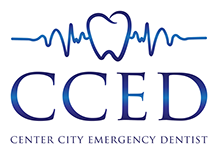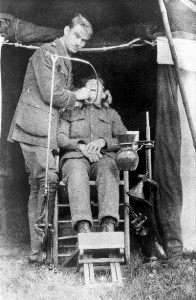Many of us have, as a result of a minor accident or circumstance of birth, ended up with less than perfect teeth. When society shows a preference for and admires a beautiful smile, it can be difficult to feel confident about your teeth if they have any noticeable issues. That’s why we’re making a series of blog posts that will discuss what cosmetic dentistry can do to make your smile perfect. Up first is fixing damaged, crooked or misshapen teeth with procedures like crowns, Lumineers, veneers, bridges or Invisalign.
Crowns
Crowns are a not often used to fix a smile, since they requires removing large parts of the tooth’s original structure, which is, of course, an irreversible procedure. That means crowns are most often used when the teeth have already suffered significant damage or issues, and more moderate options aren’t available. However, our crowns look beautiful and natural once they’ve been planted, which just goes to prove that we can turn even severely damaged teeth into that beautiful smile we all dream of.
Veneers
Veneers are in many ways a more conservative option to crowns. They can be used to fix chipped, stained or discolored, crooked, misshapen and oddly gapped teeth. In practical terms, veneers are a porcelain “cover” that’s inserted onto your teeth to give them the appearance of a perfectly shaped and aligned smile. Porcelain veneers are stain resistant and natural-looking, and they don’t usually require extensive reshaping of your teeth, but the process is irreversible and requires the removal of enamel. For anyone whose teeth require a medium amount of work, veneers may be the perfect option to brighten up your smile.
Lumineers
Lumineers are a less invasive version of traditional porcelain veneers. They, too, are a kind of a “cover” that goes on top of your teeth, but they require no preparation, drilling of teeth, etc. They are made out of a thinner, yet durable, type of porcelain than traditional porcelain veneers. Lumineers can be used for the same issues as porcelain veneers – crooked, misshapen, etc. teeth – but for finding out which option is the best for an individual customer’s needs, we recommend consulting one of our expert dentists who are specialized in cosmetic dentistry.
Bridges
The option of a bridge is most often recommended to people missing one or more teeth. It requires extensive reshaping of the remaining teeth, after which a bridge of natural-looking teeth is inserted on top of them. A bridge often lasts a lifetime, although, in some cases, it may need to be replaced or fixed. So if you’re worried that missing a tooth or teeth means the situation for your smile is hopeless, you’ll be glad to know that a bridge can give you a smile even more perfect than you had before. To find out if a bridge is right for you and what kind of a bridge would be the best choice, you should contact us directly.
Invisalign
For teeth that need to be straightened, Invisalign is a less visible option to traditional braces. Its see-through appearance on top of your teeth is practically unnoticeable and only, generally, requires the same time for treatment as regular braces. You can remove the aligners at any time you want, but it’s recommended you keep them on for 20 to 22 hours a day for optimal results. However, if there’s a special occasion you want to attend without them, the time window does give you the opportunity to do so. Anyone getting Invisalign will be given an individualized treatment plan and checkup schedule that will function as their roadmap to a beautiful smile.
We at Center City Emergency Dentists have myriad additional options, like reconstructive surgery, available for customers looking to make their dream of a beautiful smile come true. We are also the leading experts in center city Philadelphia on dental implants and more. The comfort and lasting, beautiful smile of our patients are a priority to us, and we would love to answer any questions anyone considering cosmetic dentistry, or other procedures, has in mind.

 As we approach the end of the year, it’s usually customary to take a little look back on times gone by. As a company that has a long history in the field of dentistry, we’ve always made a point of taking pride in all the hard work from years past that we’ve built our success on, but without living in the past. This month, though, to celebrate the end of another successful year, we thought it might be fun to tell you a little bit about the history of our profession. It’s a very long and eventful history, so we can only fit bits and pieces into one blog post, but we hope they give you a general idea.
As we approach the end of the year, it’s usually customary to take a little look back on times gone by. As a company that has a long history in the field of dentistry, we’ve always made a point of taking pride in all the hard work from years past that we’ve built our success on, but without living in the past. This month, though, to celebrate the end of another successful year, we thought it might be fun to tell you a little bit about the history of our profession. It’s a very long and eventful history, so we can only fit bits and pieces into one blog post, but we hope they give you a general idea. describing dental methods from how to treat decayed teeth to using wires to fix loose teeth. Similarly, there are extensive writings about topics like the importance of oral hygiene (yes, dentists have been desperately trying to promote it for several millennia now) from the Ancient Roman medical writers.
describing dental methods from how to treat decayed teeth to using wires to fix loose teeth. Similarly, there are extensive writings about topics like the importance of oral hygiene (yes, dentists have been desperately trying to promote it for several millennia now) from the Ancient Roman medical writers.